February 2022: Olive Tree

Volume VI/Issue 11/February 2022


From The Editorial Desk
Preparing For Lent
Before the next Olive Tree comes out we will be in the holy season of Lent. In just a few days it will be Septuagesima. (February 13) Last month we considered how to get on a budget and should have ten days worth of data on how we are spending our money.
There are other practices to consider for the holy season of Lent. Pope Michael says that how we spend our time and money shows us what we truly hold to be important. And so let us take next week and track how we spend the over ten thousand minutes we have each week. How many hours do we devote to our entertainment and luxury and how few minutes do we spend with Almighty God? Let us resolve this Lent to spend more time with Almighty God and with our families and less time on our own self. Let us remember that we are not our own.
And so next week, track how you spend the 168 hours God has allotted to us in the week. That is 10,080 minutes. Are we using our time wisely or squandering this precious commodity. Is God truly the center of our life? This practice will show us where our heart really is.
Lent is a time of spiritual spring cleaning as our ancestors used to have a thorough spring cleaning. It is a time to retire a little more from the world than we have in the past. It is a time to look at our spiritual life sincerely and see where we are at and where we are going and where we have strayed from the path God has placed before us.
Lent starts on Ash Wednesday, March 2nd, which is a good time to go over how we spend our time and our money and examine our conscience and make any changes necessary.
"Behold, now is the acceptable time; behold, now is the day of salvation." (2 Corinthians 6:2)


Awake or “Woke”
Every child in elementary school will have the word awake in his or her vocabulary. Until recently neither they nor many of us adults had the word woke in our verbal arsenal.
If you check a dictionary (as I did), you’ll find that the words are virtually identical in their meanings.
Awake has a variety of meanings, but primarily we mean that we are not asleep. Woke comes from the word wake. Even though it has a variety of meanings, it too often means “to rouse, to be aware.”
In the Bible we have the Lord urging us to “Rise (awake) thou that sleepest, and arise from the dead: and Christ shall enlighten thee.” (Ephesians 5:14). Such an admonishment is needed by all of us fairly often.
On the other hand, the word woke, though similar in meaning to awake, has come to mean some- thing quite different in recent times. It is the watchword of the so-called progressives in our society.
The “woke” crowd demands that we accept, with out protest their agenda and, of course, they want us to help them pay for it. They have created their own religion of sorts.
Their rallying cries are homo sexuality, trans-genderism, racial issues, feminism and the climate change (Green New Deal).
As they take in all of these issues, they are orchestrating division on all levels of our society. With a background of Marxist, communist ideology, they want to break apart our democracy and our republic.
With their rabid hatred of the Bible, they are hostile toward Christ and his Church.
In the interest of achieving their goals they lie, cheat, steal, loot, burn, rob and kill.
Their friends in government, the media, entertainment outlets, sports organizations and many churches are so blinded by the smokescreen they create that they naívely and foolishly get in lockstep with them.
Let me say it clearly, repeatedly and unapologetically: The Church is “for” a lot of things and we are “against” a lot of things. Being “awake” is a positive thing, but there is no version of this “woke” business that can be commend.
In order to be biblically correct, it is necessary that we be politically incorrect.
Consequently, The Church must raise our voice, we must turn up the volume and we must speak with truth to the times. While so many denominations and so called Catholic Institutes and so called Orthodox Institutes are concerned about being “relevant” and “relational” (their terms), The true Church of Jesus Christ is sounding the trumpet of alarm on behalf of revival, repentance and regeneration.
I thank God for the Saints of past generations who stood tall in their generations. We honor them often on the pages of books, but they are no longer here to do the job they once did.
Today somebody needs to stand as they stood. It is our turn. Let’s not hesitate and let’s not fail to rise to the occasion, stand up, be a mouthpiece for the Lord God and let our generation hear from the “awake” crowd.
They need to know that “woke” is a false economy but they do have a choice. We can help them see and understand that “awake” is the right way and “woke” is not.

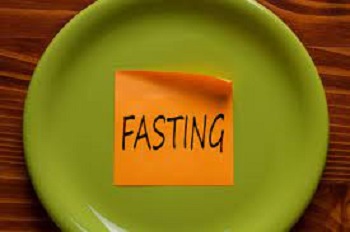
Fasting
"And Jesus said to them: Can the children of the bridegroom mourn, as long as the bridegroom is with them? But the days will come, when the bridegroom shall be taken away from them, and then they shall fast." (Matthew 9:15)
On March 2nd we will begin the holy season of Lent. Fasting today is much lighter than it was even a century ago. Let us consider the question Saint Thomas asked and answered in the Summa: "Is three in the afternoon the appropriate time for the faster's meal?" Yes people ate once a day and it was not a great deal. Consider that they did not eat eggs, which is why on Easter we color eggs in memory of their return to our plate.
And penitential seasons went beyond mere fasting. Courts of law were closed, during Advent, Lent and Septuagesima. Theaters would also be closed at this time. Many would instead go to church for Mass or a visit.
A century ago in Catholic Schools children were given a Mite Box. For every sacrifice they made, such as not buying a piece of candy or going to a movie, they would put the money in the box. At the end of Lent these were collected and the money sent to the missions. We could do the same thing by abstaining from going to a restaurant or buying fancy food or other luxuries, giving the money to the Church. Instead of buying a Starbucks, give the five dollars to the Church. For every week day that would be $165 over the whole of Lent. If we give up going out to eat for Lent, and we go out once a week, this would save almost another hundred dollars. What else can we give up for the love of God.
"Greater love than this no man hath, that a man lay down his life for his friends." (John 15:13) Shouldn't we be living our life for God, Who is our best Friend and has done so much for us? Lent is a good time to rededicate our self or if we haven't to dedicate our self wholly to the service of Almighty God.
Just before Lent begins we read I Corinthians 13 on charity. Let us review this and make sure this is our way of life. Let us remember all of the attributes we should have, such as kindness and seeking not our own. Remember we don't truly own anything, but are merely caretakes. We are not our own, but God's.
And so how much should we eat? In Aquinas' time people ate a simple meatless meal once a day. Later on a second was permitted in the evening and the main meal moved to noon, which is why Vespers was moved forward. People originally ate after Vespers. The idea of three meals a day is a new invention. A manual commenting on the Third Order of Saint Francis Rule from over a century ago mentions that third order members only ate two meals a day on regular days.
Our Lady said at La Salette: "The world takes no notice of Lent. People go to the butchers like dogs." If that was true over a century and a half ago, how much more so today, when fasting among most has been virtually eliminated. Father Leonard Goffine wrote at the same time: "to wish to feel no aggravation in fasting, is to wish not to fast at all." Or to use a secular maxim: "no pain, no gain." This is true in the spiritual life. God sends us tribulations, including pain, to teach us and prepare us for His holy work. Let us accept all God sends us and think Him for all of these blessings, because even tribulations are blessings and prepare us. The Pope found this out last fall, when he was in a wreck. Saint Alphonsus tells us we gain thousands of times grace, when we thank God for tribulation, than when we get things our own way.
The Pharisee in his boastful prayer said: "I fast twice in a week: I give tithes of all that I possess." (Luke 18:12) Although we should not fast with a pharisaical intention, we should voluntarily add to the very minimal fasts of the Church some voluntary fasts.
Let us return to Goffine: "Why does the Church forbid the use of flesh-meat on Fridays and Saturdays?
"'The Church,' says Pope Innocent, 'forbids the use of flesh-meat on Fridays because our Lord died on that day, and on Saturdays because on that day He rested in the sepulchre, and also that we may be better prepared by this abstinence for Sunday'. In many dioceses the use of flesh-meat is allowed on Saturdays, and the permission is so marked in the calendar, and every year announced to the people; for this dispensation the faithful should perform another good work and fast the more conscientiously on Fridays."
Saint Francis de Sales makes some recommendations on preparing for Holy Communion: "BEGIN your preparation over-night, by sundry aspirations and loving ejaculations. Go to bed somewhat earlier than usual, so that you may get up earlier the next morning; and if you should wake during the night, fill your heart and lips at once with sacred words wherewith to make your soul ready to receive the Bridegroom, Who watches while you sleep, and Who intends to give you countless gifts and graces, if you on your part are prepared to accept them. In the morning rise with joyful expectation of the Blessing you hope for, and (having made your Confession) go with the fullest trust, but at the same time with the fullest humility, to receive that Heavenly Food which will sustain your immortal life. And after having said the sacred words, "Lord, I am not worthy," do not make any further movement whatever, either in prayer or otherwise, but gently opening your mouth, in the fulness of faith, hope, and love, receive Him in Whom, by Whom, and through Whom, you believe, hope, and love. O my child, bethink you that just as the bee, having gathered heaven's dew and earth's sweetest juices from amid the flowers, carries it to her hive; so the Priest, having taken the Saviour, God's Own Son, Who came down from Heaven, the Son of Mary, Who sprang up as earth's choicest flower, from the Altar, feeds you with that Bread of Sweetness and of all delight. When you have received it kindle your heart to adore the King of our Salvation, tell Him of all your own personal matters, and realise that He is within you, seeking your best happiness. In short, give Him the very best reception you possibly can, and act so that in all you do it may be evident that God is with you. When you cannot have the blessing of actual Communion, at least communicate in heart and mind, uniting yourself by ardent desire to the Life-giving Body of the Saviour."
Let us consider that major feasts are usually preceded by a vigil. Sometimes fasting and abstinence are connected with such vigils, such as the Vigil of Pentecost and of the Nativity. Preparing for Communion has become quite haphazard in the last century and a half. The fast laws themselves have been relaxed from nothing from midnight to a mere three hour fast before afternoon or evening Mass. (The three hours also applies to morning Mass, although fasting from midnight is recommended.)
Saint Alphonsus Rodrigues says: "But when we join penance to prayer, when we mortify our flesh and afflict ourselves before Him, then we more easily and certainly obtain what we desire." The main theme of Fatima is prayer and penance. Let us remember a footnote in the Douay-Rheims: ""Do penance": Paenitentiam agite. Which word, according to the use of the scriptures and the holy fathers, does not only signify repentance and amendment of life, but also punishing past sins by fasting, and such like penitential exercises." And so Lent is an excellent time to reform our lives. It is a good time to seriously examine ourselves.
Saint Alphonsus Rodrigues reports: "St. Bonaventure relates that the Blessed Virgin appearing once to St. Elizabeth of Hungary, told her that God did not ordinarily grant any particular grace or favor to a soul but by means of prayer and bodily penances." Prayer and penance are a package deal. One will not be near as effective as the other.
Let us remember this: "Penance for the Christian is not satisfied by withdrawing from sin, by detesting a past life badly lived, or by the sacramental confession of these same sins. Rather, penance also demands that we satisfy divine justice with fasting, almsgiving, prayer and other works of the spiritual life." (Pope Clement XIII, Appente Sacro)
Jesus advised two different people to go now and sin no more. Let us make this our goal this year, especially during Lent.
PRACTICE: Last month we recommended taking a month and keep track of how we spend out money, during this month of February. Next week keep track of how you spend the over 10,000 minutes you have. At the beginning of Lent, let us examine these two things and see where we need to make changes in our lives in how we spend our time and money.


The Examen
There are so many ways to pray, i.e. the Holy Rosary, Breviary, lectio divina etc. Now I will share the examen. I am not a Jesuit but I was trained under the Jesuits and from them I learned the Ignatian way of consciousness examen. This method of prayer can be prayed twice a day, one at the lunch time and the other before bedtime.
Presence of God. Before you formally start, try to acknowledge the presence of God. Yes, God is always present but the sad part is we are absent or not attuned at his presence. Just like your television, yes it's on however it's on a different channel.
Second, Count your blessings. This is the part wherein you focus on the things that you are grateful with or the blessings that you have received. Example, a new pair of shoes, a delicious meal or maybe spiritual insights you have gained by attending the Holy Mass. Count your blessings not your problems.
Third step, Emotions. What are the dominant feelings which you encounter today? Are you sad or happy? Are you anxious or at peace ? Does it draw you closer to the Lord or draw away from Him?
Fourth step. Healing. What area of my life that needs healing? Why this? Please beg the Lord for forgiveness and accept His forgiveness.
Fifth step, Praying for my next activities and plans for the day. Here you present to the Lord your plans and seek direction.
End with Pater Noster or the Lord's prayer.
The Examen just shared leads me to discern which is God's will or not. The Examen is a best tool for judging the path a pray-er is leading : am I journeying towards Him or away from Him.
Happy praying.

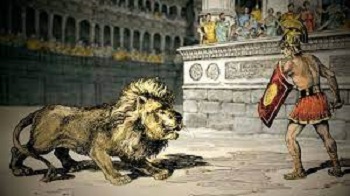
There Are Lions to Fight
“And therefore we also having so great a cloud of witnesses over our head, laying aside every weight and sin which surrounds us, let us run by patience to the fight proposed to us: Looking on Jesus, the author and finisher of faith, who having joy set before him, endured the cross, despising the shame, and now sitteth on the right hand of the throne of God.”—Hebrews 12:1-2.
In the Old Testament it was not unusual to see a man of God defeating a lion. Samson did it and came back later and got honey from its carcass. David killed one that was after his sheep. Benaiah, one of David’s mighty men, killed a lion in a pit on a snowy day. Daniel, a great prophet of God, had his lions’ den; but God simply shut their mouths. But some early Christians didn’t fare so well with lions. In the early days of Christianity, Rome was the capital of the world. And the most popular place there was the Colosseum, where great chariot races were held and where gladiators fought and where Christians died. There is no way to tell how many were slain by lions in the Roman Colosseum.
Even today in its ruins, it still looks magnificent. It measured 650 feet by 573 feet and enclosed an oval arena 287 feet long and 180 feet wide and 150 feet high. Get that picture in your mind if you can. On all sides was balcony after balcony until forty galleries surrounded that oval arena.
Here kings and senators sat among the spectators. There have been many estimates as to how many it would hold. But at least 45,000 came to see the blood flow and especially to hear the Christians scream as they fought hungry lions.
Under those galleries were cages where the lions were kept without food until they were wild with hunger.
When the time came for the games, people would come from everywhere by the thousands until they filled one gallery, then the second gallery, then the third gallery, then the fourth, the fifth—until finally all forty galleries were crammed with people.
What laughter! What noise! They had their wine and got drunk. Excitement was everywhere overwhat was about to take place.
A man stands, blows a trumpet and silence falls over the crowd! “Let the games begin!”
A Roman soldier marches a Christian out into the center of the arena and puts a sword in his hand. The soldier goes back, leaving the Christian in the arena with the sword. A hush falls over the crowd.
All of a sudden you hear from down below one of the cages sliding open. The clang of the door seems to excite the people. They sit on the edges of their seats, waiting for the thrill, for the excitement to begin.
Then a hungry lion charges out. The Christian strikes him. The lion charges again. The Christian strikes again. This time the lion falls dead.
Those 45,000 spectators many times raise their thumbs, indicating, “Let him go!” but that just doesn’t happen, because another lion is let loose and another and another until finally the Christian lies dead in the arena—one Christian after another as each in turn fights the hungry lions.
A cart is brought out to get the bodies. They are thrown on the cart and the cart is pushed out of the gate—the gate aptly called the Gate of Death.
In Rome that was their entertainment. That was their sport.
Paul was very familiar with that. He knew about the games and referred to them. He spoke of running the race that is set before us. He spoke of fighting the good fight of faith and wrestling.
In Hebrews 12:1 Paul sees the earth as the arena for the Christian to fight in and the heavens are the galleries.
For us Christians—this world is our Colosseum. Somebody is watching us all the time. God, when He saved us, could have taken us on to Heaven; but He chose not to do that. Instead, He marches us out into the center of the arena called the earth, places in our hands this Sword and leaves us here to “fight the good fight of faith” (I Tim. 6:12).
Every Christian has a lion to fight. I know what mine is. Do you know what yours is?
Paul’s was a thorn in the flesh. Peter’s was pride. Thomas’s was doubting. Is yours a bad temper? pride? lust? fear? envy? or poor health? Or yours may be poverty, pain or depression. But you do have a lion to fight. If you say you don’t, then you have let that lion conquer you. Live for Christ as you should and you will face your lion.
Notice this. In Hebrews 11 Paul had just named and listed the heroes of faith—Abel, who offered a more excellent sacrifice; Noah, who found grace in the eyes of the Lord; Enoch, who walked with God and was not for God took him; Abraham, who staggered not at the promise of God through unbelief but was strong in faith, giving glory to God and being persuaded that what He promised He was able also to perform; Moses, who delivered Israel—Moses, who talked with God face to face.
Then Paul says, “Therefore we also having so great a cloud of witnesses over our head, laying aside every weight and sin which surrounds us, let us run by patience to the fight proposed to us.”
While we are on the earth fighting our lions, those in Heaven are eagerly watching our fight. We are not alone in this conflict.
I. The Gallery of the King
In the old days, in the first gallery sat Nero or Tiberias, the reigning emperor. At times he paid no attention to what was going on. The lions could kill the Christian and the emperor would not even recognize it. With arms folded, he didn’t care who won—the Christian or the lion. He was there strictly for the excitement, the thrill, the crowds, the wine.
When Christ marches out in the arena, puts the Sword of the Lord in our hands and gives the command, “Fight the good fight of faith,” He watches us. In the first gallery sits the caring King of Kings. Not only does He care, He gets down from His special seat, comes down into the arena, puts His arms around us and comforts us with these words, “I’ll fight with you.”
How can we lose with Him by our side and compassed about with so great a cloud of witnesses? Not only is He for us, but He comes down to help us.
Are you poor? Jesus Was poor. Ask Mary: she knew. Ask the wise men: they knew. He never owned a thing. “The foxes have holes, and the birds of the air nests; but the Son of man hath not where to lay his head.”(Luke 9:58).
Poor? He knows about it. He cares about it. He shares it. Not only that, He comes to help out. Have you ever prayed for something you desperately needed and have had Him supply it so simply and so unusually? Strange that when we get desperate, we seem to fall on our knees. Oh, we pray standing up for food that is now on the table; but if it is not yet on the table, we get on our knees.
Yes, He cares—cares about your poverty, about your sickness, about your disappointments, about your discouragements.
Has some trusted friend turned on you? We all have experienced that, haven’t we? But He cares! He understands our grief in this.
Are you poor? Your Father is rich in houses and lands. Are you sick? The Great Physician now is near, the sympathizing Jesus. Are you troubled? He is our very present help in time of trouble.
Are you discouraged? Oh, let Him put His arm around you and encourage you.
“Let not your heart be troubled. You believe in God, believe also in me. In my Father's house there are many mansions. If not, I would have told you: because I go to prepare a place for you. And if I shall go, and prepare a place for you, I will come again, and will take you to myself; that where I am, you also may be.” John 14:1–3.
Are you weary in the work? Do you sometimes feel like giving up? Fight that lion! Listen to the Son of God who said, “For the Lord himself shall come down from heaven with commandment, and with the voice of an archangel, and with the trumpet of God: and the dead who are in Christ, shall rise first. Then we who are alive, who are left, shall be taken up together with them in the clouds to meet Christ, into the air, and so shall we be always with the Lord.” (I Thess. 4:16).
II. The Gallery of the Angels
We all have lions to fight. The King is watching us. In that fine gallery up in Heaven is the King of Kings who cares about what we are doing. In the second gallery up there are guardian angels watching over God’s children.
There is the angel who escorts to Heaven all those who die. There are Gabriel and Michael. An angel announced the birth of Christ: “For unto you is born this day in the city of David a Saviour, which is Christ the Lord” (Luke 2:11). An angel host sang that first Christmas carol: “Glory to God in the highest” (vs. 14).
To know they are up there watching us and caring causes my courage to mount and my heart to beat faster. I want to shout, “Oh, if the King is for me, if He is watching, if He cares; and if the angels are for me and are watching me, let the lions proceed! I’m not afraid. With the Sword of the Lord in my hand and with God and the angels by my side, I’ll gladly fight the good fight of faith.”
III. The Gallery of the Saints
A gallery of saints look on. Don’t think those who have gone on before us don’t see us who are left. Fight your lion! Use wisely your Sword. Those old great saints have been in battle. They have fought their lions.
In the old days in the Colosseum galleries there was much excitement. As Christians fought the lions, the spectators couldn’t keep quiet. “Hit him again!” “Attack him!” “Dodge!” They too were into the fight, egging them on. I believe there is such excitement going on now up in Heaven. They are encouraging us, “Go on!” “Fight on!” “Don’t quit!”
Saint Paul chimes in: “I have fought a good fight, I have finished my course, I have kept the faith. As to the rest, there is laid up for me a crown of justice, which the Lord the just judge will render to me in that day: and not only to me, but to them also that love his coming.” (II Tim. 4:7, 8). “So fight on!”

Leftist Wants California to Abolish Parenthood, Make Parents Give Away Their Kids to Achieve “Equity”
A column by Joe Mathews (was) published in the Ventura County Star on [January 13]:“California should abolish parenthood in the name of equity.”
If you think the author wrote this from an asylum you would be wrong....However, when you read his rantings for “equity” you might think he belongs in some sort of institution.
Fathers and mothers with greater wealth and education are more likely to transfer these advantages to their children, compounding privilege over generations.
As a result, children of less advantaged parents face an uphill struggle, social mobility has stalled and democracy has been corrupted And now comes Mathew’s “solution” that qualifies him for institutionalization.
“My solution—making raising your own children illegal—is simple and while we wait for the legislation to pass, we can act now: the rich and poor should trade kids and homeowners might swap children with their homeless neighbors.”
“...Some naysayers will dismiss such a policy as ghastly, even totalitarian. But my proposal is quite modest; a fusion of traditional philosophy and today’s most common political obsessions.”
Businesses Fleeing Cities Where Crime Is Unchecked
A top official with Union Pacific revealed...that the company couldmove its rail operations from Los Angeles County unless law enforcement stops thieves from raiding shipping containers.
...A viral video showed how thieves are pillaging through shipping containers in the...Lincoln Heights neighborhood. Tens of thousands of destroyed packages littered the area around the rail tracks. Adrian Guerrero, general director of public affairs...revealed that “over 90 containers are compromised per day.”...
However, the actual crimes are not the only issue. Guerrero explained that far-left criminal justice policies have exacerbated the problem and emboldened criminals....
...Guerrero explained...that despite over 100 criminals having been arrested while actively vandalizing trains, Union Pacific “has not been contacted for any court proceedings.”
Suicide Bomber Kills Six, Over a Dozen Others Suffer Injuries in Christmas Day Attack
A suspected Islamist suicide bomber from a rebel group aligned with Islamic State killed at least six people, including children, and injured more than a dozen others when he used an explosive device to kill himself at the entrance of a busy restaurant where Christmas was being celebrated in the Democratic Republic of Congo.
Christian Women’s Shelter Won’t Be Forced to Admit Trans-Identified Males, Federal Judge Rules
Amid a years-long legal battle, a federal judge ruled [in December] that the city of Anchorage, Alaska’s nondiscrimination ordinance barring LGBT discrimination does not force a Christian battered women’s shelter to admit trans-identified biological males. ...Judge Sharon Gleason of the U.S. District Court for the District of Alaska determined that Downtown Soup Kitchen Hope Center of Anchorage does not have the standing to sue the city over a revision to its ordinance declaring that places of public accommodation can’t discriminate based on sexual orientation or gender identity because the center is not a place of public accommodation.
Therefore, the faith-based homeless shelter created to serve battered women fleeing domestic abuse and homeless women, part of a ministry to the underprivileged that includes a soup kitchen, will not have to admit trans-identified males....
[Attorneys for Alliance Defending Freedom] said that Anchorage officials have twice “targeted the center for operating according to its religious beliefs and for serving the city’s homeless population.”
Sheriff Refuses to Remove Bible Verse From Office
A North Carolina sheriff who’s garnered national attention for refusing to remove a Bible verse from a wall at his office cited a need for “more Jesus” as the reason for his decision not to comply with the demands of a leading atheist legal organization to take it down.
Jody Greene, the sheriff of Columbus County, North Carolina, addressed the Madison, Wisconsin-based Freedom From Religion Foundation’s concerns about the Bible verse Philippians 4:13 being displayed on a wall at the sheriff’s office in a Facebook post....
Greene pushed back on the claim that the display constituted a “government sponsorship of religious messages.”
The sheriff added, “The Bible verse was placed on the wall after I took office. It was paid for with private funds, not with county funding. The verse is one of my favorite Bible verses and it seemed fitting for all the adversity I have had to endure.”
Johns Hopkins reports:
After studying 34 studies, they concluded: "We find no evidence that lockdowns, school closures, border closures and limiting gatherings have had a noticeable effect on COVID-19 mortality. … More specifically … studies find that lockdowns in Europe and the united States only reduced COVID-19 morbidity by 0.2% on average."
385,000 died in the US in 2020, so lockdowns only reduced deaths by 770. Between May 2020 and April 2021 the US recorded 100,306 overdoses, which is a 28.5% increase over the previous twelve months of 78,056. The question how many of these 22,250 are a result of lock-downs.
In another report by them: "Science shows clearly that the best defense agains the coronavirus is natural immunity. If you've had COVID, you have natural antibodies that are far more powerful that the vaccines. Independent medical studies show that 'natural immunity was 27 times as effective as vaccinated immunity in preventing symptomatic illness.'"

The Funny Pharmacy
A joyful mind maketh age flourishing: a sorrowful spirit drieth up the bones. - Proverbs 17:22


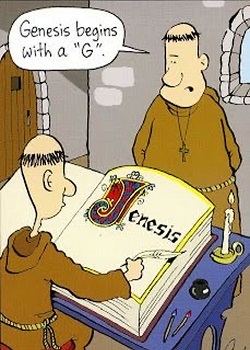
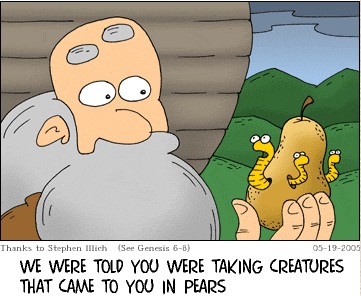

Frequently Asked Questions

What Did Jesus Mean When He Said Do Not Judge That You be Not Judged?
Time and Time again people love to use the phrase “Judge not that ye be not judged” It has been misused and misinterpreted over the years.
Some of us have wrongly judged another person and have sinned in the process. In our rush to judgment, in our haste to make sure someone else takes the blame, in our zeal to find the guilty party, we have violated the words of Jesus in Matthew 7:1, “Judge not, that you may not be judged”. The words are simple and clear. They are plain and unambiguous. Because they are familiar we tend to forget about them. Or worse, we find a way to explain them away.
There are several ways we can approach a text like this. We could spend a lot of time talking about the illustration Jesus used about the speck in your brother’s eye and the log in your own eye. It’s funny and ironic and when Jesus spoke these words, I’m sure his hearers laughed out loud. I’ll return to that illustration shortly but first let’s just focus on verse 1. What exactly did Jesus mean when he said, “Judge not"?
Perhaps it is easier to say what he did not mean. Jesus is not saying we should never pass any sort of judgment. Every day we make hundreds of judgments about things around us. It is not wrong, for instance, to sit on a jury and render a verdict. Nor it is wrong for an admissions committee to decide which students to accept and which to reject. Nor it is wrong for an employer to decide who gets a promotion and who doesn’t. Nor is it wrong for schools to judge certain students worthy of high honor at graduation. Nor is it wrong for a High School to expel students who participate in hazing incidences and to ban them from attending graduation ceremonies. We all have to make decisions every day that involve other people. We pass judgment on appearance, behavior, speech, deportment, attitude, work ethic, productivity, keeping or breaking a promise, guilt or innocence, which person we believe and which person we do not believe. Whatever the words of Jesus mean, they can’t mean that we never pass judgment in any sense at any time.
What, then, did Jesus mean when he said, “Judge not?” The word translated “judge” often means to condemn. It means to come to a negative conclusion about another person and then to condemn them. That is what Jesus is forbidding. Let me be a little more specific about this.
First, we are not to pass final judgment on any person. Final judgment belongs to the Lord. If anyone needs to be condemned, God has that responsibility himself. We should have no part in it.
Second, we are not to judge the motives of others. The Bible says, “man seeth those things that appear outwardly, but the Lord beholdeth the heart. ” (I Samuel 16:7). Often we are quick to come to negative conclusions about others based on why we think they did something. But try as we might, we see only the outside. God alone sees the heart.
We can judge what people do; we cannot judge why they do it.
We can judge what people say; we cannot judge why they say it.
Only God can judge the hidden secrets of the heart. Leave that judgment to him. You don’t even know your own heart, much less the heart of anyone else. “The heart is perverse above all things, and unsearchable, who can know it?” (Jeremiah 17:9). Sometimes when little children have been caught disobeying and you ask them why they did it, they will reply tearfully, “I don’t know.” That’s not a cop-out; it’s a profound theological truth. We are so wicked by nature that we don’t know why we do what we do. All of us can remember times when we did or said something foolish, and looking back we can honestly say, “I don’t know why I did something stupid like that.” But if we can’t understand our own heart, how can we ever presume to understand anyone elses?
For answers to more frequently asked questions, click here: https://www.vaticaninexile.com/frequently_asked_questions.php
The Pope Speaks: February 2022
Why Won't People Come to Pope Michael

In the eighth chapter of II Esdras we read: "And the seventh month came: and the children of Israel were in their cities. And all the people were gathered together as one man to the street which is before the water gate, and they spoke to Esdras the scribe, to bring the book of the law of Moses, which the Lord had commanded to Israel." As we continue to read, we find that the people found out they have sinned and repented of their sins.
The question is this, why aren't people coming to Pope Michael and asking to hear the Word of God? Why are they going other places? The main reason is that people have forgotten how this all began. This began with Vatican II (1962-1965), which taught heresy and to conform with these heresies instituted new rites of the Sacraments, beginning in the late 1960's. The problem is not the Novus Ordo and new rites of the sacraments, they are only a symptom of the real problem, heresy. The solution does not lie in attempting to preserve the Catholic Rites of the Sacraments, but in preserving the Catholic Faith itself in accordance with Scripture and Tradition.
Jesus said: "And it came to pass, as he spoke these things, a certain woman from the crowd, lifting up her voice, said to him: Blessed is the womb that bore thee, and the paps that gave thee suck. But he said: Yea rather, blessed are they who hear the word of God, and keep it." (Luke 11:27-28) Commenting on this Saint John Vianney tells us that hearing the word of God is more important than receiving the Holy Eucharist: "Perhaps it seems to you, my brethren, that Jesus Christ teaches us that he who hears the word of God with the earnest wish to profit by it, is more pleasing to God than he who receives Him in Holy Communion."
"Behold the days come, saith the Lord, and I will send forth a famine into the land: not a famine of bread, nor a thirst of water, but of hearing the word of the Lord." (Amos 8:11) We are here, because there is a famine of hearing the Word of God among people. The reason is simple. As demonstrated in Our book, Will the Real Catholic Church Please Stand Up, We prove that Traditionalist priests and bishops do not claim the Office of Pastor, and that they do not possess that Office in the Catholic Church. They have not been sent by Almighty God through His holy Church to preach the Word of God. They may stand up and speak, but they are only a sounding brass or tinkling cymbal. (I Corinthians 13:1)
"He said therefore to them again: Peace be to you. As the Father hath sent me, I also send you." (John 20:21) It is this sending that is important. A man may possess Holy Orders, but without this sending from God through His holy Church, he may not preach the Word of God and his preaching will be of little effect. Saint Paul asks: "And how shall they preach unless they be sent, as it is written: How beautiful are the feet of them that preach the gospel of peace, of them that bring glad tidings of good things!" (Romans 10:15)
"Where there is no governor, the people shall fall: but there is safety where there is much counsel." (Proverbs 11:14) In the December 2018 Pope Speaks We quoted Daniel Dolan, who says that he is merely a Sacramental Bishop. Priests and Bishops should be more than mere ministers of the Sacraments. They must hold the Office of Bishop or of Pastor, which they do not. (I Timothy 3:1) In fact without either the Office or delegation from someone who has the Office, they are not ministers but merely going through the motions. True the Sacrament may be valid, but that has never been the question. The question is: "Have they been sent by God through His holy Church to minister unto us?"
"My people have been silent, because they had no knowledge: because thou hast rejected knowledge, I will reject thee, that thou shalt not do the office of priesthood to me: and thou hast forgotten the law of thy God, I also will forget thy children." (Osee 4:6) Look up priesthood and you will see that it is more than an Order, it is an Office.
After observing the Feast of Tabernacles in Scripture we read: "And the seed of the children of Israel separated themselves from every stranger: and they stood, and confessed their sins, and the iniquities of their fathers." (II Esdras 9:2) In the next chapter they set things right in the temple. Notice the Order. First they came to hear the Word of God from someone sent by God. Today they would look for Pope Michael and preachers in communion with him. Next they obeyed the Word of God. Then they repented of their sins. Only after all was accomplished did they offer sacrifice.
In the Mass for the election of a Pope we pray at the Offertory: "They shall not have part in the holy things, till a Pontiff shall arise who shall show them truth." (III Esdras 5:40) Pope first, then the Mass. Any other order is actually disorder and creates a mess as we see in Traditionalism. As Donald Sanborn, a Sacramental Bishop, often said: "The fish rots from the head." As We observed 38 years ago in a letter to Our friends, the solution must come from the Pope. Nothing else works.
As Pope Leo XIII observed in his Encyclical, Satis Cognitum: "But the Episcopal order is rightly judged to be in communion with Peter, as Christ commanded, if it be subject to and obeys Peter; otherwise it necessarily becomes a lawless and disorderly crowd. It is not sufficient for the due preservation of the unity of the faith that the head should merely have been charged with the office of superintendent, or should have been invested solely with a power of direction." Even among groups that agree on the position of the Papacy, their leadership is divided.
You need to come here as the chosen people did centuries ago, to hear the Word of God, which you cannot hear anywhere else.
Yes we make a bold assertion, that the Catholic Faith is preached here and nowhere else. Others pander to those with itching ears. (I Timothy 4:3)
"For there shall be a time, when they will not endure sound doctrine; but, according to their own desires, they will heap to themselves teachers, having itching ears: And will indeed turn away their hearing from the truth, but will be turned unto fables." (II Timothy 4:3-4) Many say that this refers to Vatican II and its perfidious spirit, and they are partially right. Traditionalism, although retaining most Catholic doctrine, has set some important points aside in order justify ministering the Sacraments outside of canonical norms. "The laity has the right to receive from the clergy the spiritual goods and especially the necessary means of salvation, according to the rules of ecclesiastical discipline." (Canon 682) This Canon sets a simple boundary, Traditionalists cross. In their search to stay within some Canons, they set aside others. They have in fact created a new type of priest and bishop, whose only function is to administer the Sacraments, as they have alluded to in their writings. The Society of Saint Pius X says that Archbishop Lefebvre merely consecrated Sacramental Bishops. Daniel Dolan said the same thing in an interview. Any priest that stands before an altar that cannot say God sent me and show how, should step away from the ministry, because he does not represent God. There are many arguments about who is valid and who is not valid, but that means nothing. The question is do these men represent Almighty God. Are they sent from God through the Pope in the proper manner. If they are not, then they do not come from God, but have come in another way. "Amen, amen I say to you: He that entereth not by the door into the sheepfold, but climbeth up another way, the same is a thief and a robber." (John 10:1)
Jesus gave the people a hard saying in the sixth chapter of John. Let us read what happened: "After this many of his disciples went back; and walked no more with him. Then Jesus said to the twelve: Will you also go away? And Simon Peter answered him: Lord, to whom shall we go? thou hast the words of eternal life." (John 6:67-69) The words of eternal life are only to be found here where the modern Esdras resides. (II Esdras 8ff) No We are not necessarily Esdras, because Esdras was a priest, but not a High Priest. As such he was sent by God, as We send priests to preach the Word of God.
Of Jesus we read: "He came unto his own, and his own received him not. But as many as received him, he gave them power to be made the sons of God, to them that believe in his name." (John 1:11-12) Jesus is coming to you through His Church here, and many of you are hear merely out of curiosity.
"Behold the days come, saith the Lord, and I will send forth a famine into the land: not a famine of bread, nor a thirst of water, but of hearing the word of the Lord." (Amos 8:11) As in the days of Esdras, today you must make the first move to come to hear the Word of God, even if it is a hard saying.
"But if it seem evil to you to serve the Lord, you have your choice: choose this day that which pleaseth you, whom you would rather serve, whether the gods which your fathers served in Mesopotamia, or the gods of the Amorrhites, in whose land you dwell: but as for me and my house we will serve the Lord." (Josue 24:15) Today is a day of decision. Will you serve God with us, or will you serve falsehood, even if it has many of the trappings of Catholicism, but misses the most important parts. As Saint Athanasius said: "They may have the churches, but we have the faith." They are building fine buildings, but they do not have the whole Word of God, nor do they have any mission from God through His holy Church.
Since they claim an extraordinary mission, because of the current crisis, we must require them to produce miracles to support that mission. In fact, one of their own demanded just that from one of the first Thuc bishops.
What people do not realize is that the first Thuc bishops were working together for the election of a Pope, following in the footsteps of Father Joachin Saenz-Arriaga. Father Moises Carmona, one of the first Thuc bishops, went to his grave with the desire for the election of a Pope.
"And Elias coming to all the people, said: How long do you halt between two sides? if the Lord be God, follow him: but if Baal, then follow him. And the people did not answer him a word." (3 Kings (1 Kings) 18:21) If Francis is Pope, then you must accept all he teaches. If Francis is not Pope, then why are you not looking at Pope Michael? Remember sede vacantes end.


Saint Mark the Ascetic
On The Spiritual Law

192. Peace is deliverance from the passions, and is not found except through the action of the Holy Spirit.
193. Fulfilling a commandment is one thing, and virtue is another, although each promotes the other.
194. Fulfilling a commandment means doing what we are enjoined to do; but virtue is to do it in a manner that conforms to the truth.
195. All material wealth is the same, but is acquired in many different ways; similarly, virtue is one, but is many-sided in its operations.
196. If someone makes a display of wisdom and instead of applying it talks at length, he has a spurious wealth and his labors 'come into the houses of strangers' (Prov. 5:10).
197. It is said that gold rules everything; but spiritual things are ruled by the grace of God.
198. A good conscience is found through prayer, and pure prayer through the conscience. Each by nature needs the other.
200. Always do as much good as you can, and at a time of greater good do not turn to a lesser. For it is said that no man who turns back ‘is fit for the kingdom of heaven' (cf. Luke 9:62).
Saints from East and West
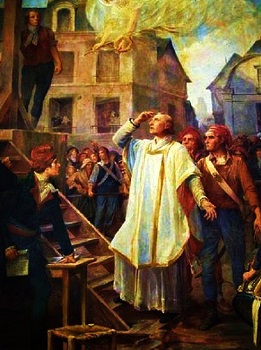
21 February - Blessed Noel Pinot.
The fact that the cause of Blessed Noel was introduced by itself and dealt with independently of the other martyrs of the French Revolution gives him a certain distinction amongst those who suffered for their faith during the Reign of Terror.
He was a simple parish priest who had been born at Angers in 1747, and had made only the ordinary studies of the secular clergy. After serving as vicaire in one or two churches, and distinguishing himself by his devotion to the sick when in charge of an hospital for incurables, he was in 1788 appointed curé in the little town of Louroux-Béconnais, where his zeal and devotion were attended by abundant fruit in the moral reformation of his parishioners.
In 1790 the Constituent Assembly forced upon King Louis XVI the measure known as the "Civil Constitution of the Clergy," which struck at the fundamental principles of Catholic Church government and which required every priest to take an unlawful oath denounced by the Holy See.
Like many other good priests, the Abbe Pinot refused to take this oath. He was arrested, and by a tribunal at Angers was sentenced to be deprived of his cure for two years. This, however, did not deter him from exercising his ministry in secret, and he was energetic in bringing back to better dispositions many priests who had not shown the same firmness as himself.
When the revolt in Vendée gained some temporary success, he openly took possession of his parish again to the great joy of his flock, and even when the arms of the Republic prevailed in that region he continued his pastoral work in defiance of civil and military authority. For some time he was successful in evading the attempts persistently made to effect his capture, but at last he was betrayed by a man to whom he had shown great kindness. He was seized when actually vested for Mass and was dragged in his chasuble through the streets amid the jeers of the rabble and the soldiery.
During the twelve days he was kept in prison, he was very roughly treated, and upon his reiterated refusal to take the oath he was sentenced off-hand to the guillotine. On February 2, 1794, he was led out to death still wearing the priestly vestments in which he had been arrested, and on the way to offer his final sacrifice he is said to have repeated aloud the words which the priest recites at the foot of the altar in beginning Mass: "Introibo ad altare Dei... I will enter unto the altar of God, to God who giveth joy to my youth." Blessed Noel Pinot was beatified in 1926.
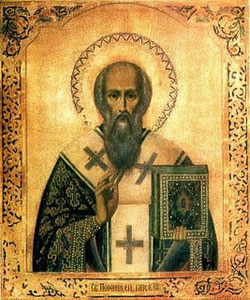
26 February - Saint Prophyrius.
Sainted Porphyrius, Archbishop of Gaza, was born in about the year 346 at Thessalonica in Macedonia. His parents were people of substance, and this allowed Saint Porphyrius to receive a fine education. Having the inclination for monastic life, at twelve years of age he left his native region and set off to Egypt, where he asceticised in the Nitreian desert under the guidance of the Monk Macarius the Great. There also he met Blessed Jerome, who was then visiting the Egyptian monasteries. He set off with him to Jerusalem on pilgrimage to the holy places and to reverence the Life-Creating Cross of the Lord, after which he resettled into the Jordanian wilderness for prayer and ascetic deeds. There Saint Porphyrius fell under a serious malady. For healing he decided to go to the holy places of Jerusalem. One time, when fully paralysed he lay half-conscious at the foot of Golgotha, the Lord sent His servant into a salvific sleep-vision. Saint Porphyrius beheld Jesus Christ, descending with the Cross and turning to him with the words: "Take this Wood and preserve it." Awakening, he sensed himself healthy. The words of the Saviour were soon fulfilled: the Patriarch of Jerusalem ordained Saint Porphyrius to the priestly dignity and appointed him curator of the Venerable Wood of the Cross of the Lord. And it was during this time that Saint Porphyrius received his portion of an inheritance from his parents - four thousand gold coins. All this he gave away to the needy and for the embellishing of the churches of God.
In 395 the bishop of the city of Gaza (in Palestine) died. The local Christians set out to Caesarea to the Metropolitan John with a request to provide them a new bishop, who would be able to contend against the pagans, which were predominant in their city and were harassing the Christians there. The Lord inspired the Metropolitan to summon the Jerusalem presbyter Porphyrius. With fear and trembling the ascetic accepted the dignity of bishop, and with tears he prostrated himself before the Life-Creating Wood and then set off to fulfill his new obedience.
In Gaza he found all of only three Christian churches, but of the pagan temples and idols there were a great many. During this time there had occurred a long spell without rain, causing a severe drought. The pagan priests brought offerings to their idols, but the woes did not cease. Saint Porphyrius imposed a fast for all the Christians; he then made the all-night vigil, followed by going round all the city in a church procession. Immediately the sky covered over with storm clouds, thunder boomed, and abundant rains poured down. Seeing this miracle, many a pagan cried out: "Christ is indeed the One True God!" As a result of this, there came to be united to the Church through Holy Baptism 127 men, 35 women and 14 children, and soon after this, another 110 men.
But the pagans just like before still harassed the Christians, passed them over for public office, and burdened them down with taxes. Saint Porphyrius and the Metropolitan of Caesarea John set off to Constantinople, to seek redress from the emperor. Saint John Chrysostom received them and rendered them active assistance.
Saints John and Porphyrius were presented to the empress Eudoxia who at that time was expecting a child. "Intercede for us," said the bishops to the empress, "and the Lord will send thee a son, who shalt reign during thine lifetime." Eudoxia very much wanted a son, since she had given birth only to daughters. And actually through the prayer of the saints an heir was born to the imperial family. In consequence of this, the emperor in the year 401 issued an edict directing the destruction of the pagan temples in Gaza and the restoration of privileges to Christians. Moreover, the emperor bestowed on the saints the means for the construction of a new church, which was to be built in Gaza on the locale of the chief pagan temple there.
Saint Porphyrius to the very end of his life upheld Christianity in Gaza and guarded well his flock from the vexatious pagans. Through the prayers of the saint there occurred numerous miracles and healings. Over the course of 25 years the archpastor guided veritable flock and reposed at an advanced age, in the year 420.

Advice You Can Bank On
A Catholic Perspective On Finances
Needs, Wants, and Savings
For some of us, ringing in the New Year may mean making resolutions and trying not to let them fall by the wayside come February, while for others, it may mean it’s just another day like any other day. Either way, we should put our best foot forward and formulate a plan for the rest of the year in the form of needs, wants, and savings
These three categories are where everything in our life is classified, and examining each one of these will help us to know if we are fulfilling our daily obligations to God, ourselves, and our family members and friends.
Food, clothing, and shelter are truly the only things we need in order for survival, and it can be easy to conflate any of these items into a want category. Perhaps we have a can of soup in our pantry, which would be all we need for food, but we saw an ad on TV for chicken and shrimp carbonara at Olive Garden, and we convinced ourselves of turning that need for food into a want. The same happens easily with clothing. Perhaps we have a closet full of last year’s styles (or maybe even last decade’s styles), and we conflate the need of clothing with the want of new styles. If your shoes have worn soles, by all means, buy new ones. Instead, however, of buying something in the latest fashion (they will not be in style come February), buy a pair that are versatile for many “walks”, and that you know will last.
Consider the words of Matthew 6:25-34, “Therefore I say to you, be not solicitous for your life, what you shall eat, nor for your body, what you shall put on. Is not the life more than the meat: and the body more than the raiment? Behold the birds of the air, for they neither sow, nor do they reap, nor gather into barns: and your heavenly Father feedeth them. Are not you of much more value than they? And which of you by taking thought, can add to his stature by one cubit? And for raiment why are you solicitous? Consider the lilies of the field, how they grow: they labour not, neither do they spin. But I say to you, that not even Solomon in all his glory was arrayed as one of these. And if the grass of the field, which is today, and tomorrow is cast into the oven, God doth so clothe: how much more you, O ye of little faith? Be not solicitous therefore, saying, What shall we eat: or what shall we drink, or wherewith shall we be clothed? For after all these things do the heathens seek. For your Father knoweth that you have need of all these things. Seek ye therefore first the kingdom of God, and his justice, and all these things shall be added unto you. Be not therefore solicitous for to morrow; for the morrow will be solicitous for itself. Sufficient for the day is the evil thereof.”
Needing does not mean that we have to dress or eat like a hobo; much like wanting does not have to put us in the poor house due to excessiveness. We may really want that apple pie at the grocery store. Do we really need it? Needs consist of basics and do not change over time. We will always need to eat, be clothed, and have a roof over our heads. The kind of need we have is where want comes into play. Wants change over time. Think about something you wanted when you were 20 years old, versus 40 years old, or something you wanted when you were 5 years old, versus 15 years old. The assumption is safe to make that those wants now are nonexistent or completely different. Evaluating wants versus needs in our daily work and tasks is paramount to identifying the category in which we are placing our habits, thus being able to adjust accordingly. “I speak not as it were for want. For I have learned, in whatsoever state I am, to be content therewith.” (Philippians 4:11)
In being able to control our habits through our needs and wants, we will be able to save. “Substance got in haste shall be diminished: but that which by little and little is gathered with the hand shall increase.” (Proverbs 13:11) In the Bible, Matthew tells us not to fret for tomorrow, for tomorrow frets for itself. Therefore, we can prepare for what may come and alleviate the worry for whatever life may bring.
For most Americans, saving is an afterthought, and certainly adding a savings category to our budgets may reduce our wants category. The wants may be 30% of our budgets, but it is 100% discretionary. As Proverbs 13:11 tells us, “that which by little and little is gathered with the hand shall increase.” Start small. Setting aside even a few dollars a week grows over time and your wallet will not miss it. Your wallet has no feelings. Take the Starbucks coffee example of $5 per coffee, for instance. When you pay for your coffee, that money is gone. It is good and spent. You likely did not miss that $5 later in the week; you may have even gone to Starbucks again before the week was out. Now consider if that $5 was set aside and untouched. If you did that as often as you bought a cup of coffee, you would have quite the starter savings account on hand.
Starting small and thinking small go hand in hand. Proverbs 6:6-8 says “Go to the ant, O sluggard, and consider her ways, and learn wisdom: Which, although she hath no guide, nor master, nor captain, Provideth her meat for herself in the summer, and gathereth her food in the harvest.” Matthew 17:19 says “Jesus said to them: Because of your unbelief. For, amen I say to you, if you have faith as a grain of mustard seed, you shall say to this mountain, Remove from hence hither, and it shall remove; and nothing shall be impossible to you.” If we have the wisdom and strength of an ant, we can plan for our futures, and if we have the faith of a mustard seed, we can move mountains.
In a bit of irony, our flesh and spiritual necessity needs and wants are transposed. We need to pray and need to fast, but we may not want to. In carefully assessing our wants and needs will we be able to discern in our daily lives where we lack and where we abound. John 15:7 says, “If you abide in me, and my words abide in you, you shall ask whatever you will, and it shall be done unto you.”

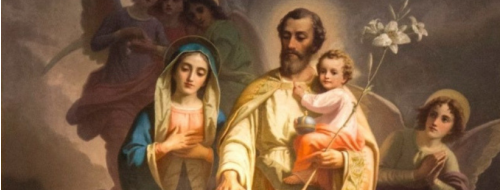 Family Matters
Family Matters
God Breathed Visions
It is important that we get a motivating vision for our homes. Only God can give us such a vision. However, we have our part to play also. When we begin to sigh and cry unto God with a longing aspiration, He is obligated to impart to us a revelation of His will, as well as a revelation of our need. It is my personal conviction that because we lack this spiritual seeing of the heart, our homes lack substance and direction. My constant prayer is that God will graciously grant us this seeing experience again and again. This seeing brings a transformation of the heart, and of course a transformation of the home will follow.
Family Matters articles must be more than a time of gathering information. New information usually lasts a few weeks, and then falls to the back of our memory. However, a vision is life changing, and it will last for many years. By the time many families that are opened to god blessing them with a quiver full of children, (Psalm 27:5), finish the task of raising their children, they will have invested about forty years in the project (not to mention the years of grand parenting that follows the parenting). It takes a vision to last that long. My desire, “by grace, through faith,” is to impart to you a vision for your children that will burn in you and consume you for many years to come.
Let us ponder some of the inner dynamics of a God-breathed vision. God moves and motivates His people by giving them a vision. The Bible is filled with examples of this inner working of God's Spirit. When God is about to do something, He begins with a vision in the heart of a man or a people. When god spoke to Abraham, He gave him a promise, but that promise had a vision of his will in it as well. God began to call “those things that are not, as those that are.” (Romans 4:17b). Abraham saw them with the eyes of his heart and began to act accordingly. This is how a vision works in the heart of man.
God spoke to the children of Israel in Deuteronomy 28. He painted a beautiful picture of a people baptized in and overflowing with blessings. This was meant to be a vision for all who would see it., believe it, and obey the conditions that He gave them. As we study the history of his people, there are times when they were literally blessed in everything they did. Those who walked in the vision that they saw received the reality of a life blessed on every side.
Now all these inner dynamics apply to our homes as well. The Bible is pregnant with god's heart for our homes. His promises, His will and His visions are waiting there to be birthed in our hearts. Visions are born when the Spirit of God takes the Word of God and makes it alive in our hearts. The New Testament word for this inner dynamic is the Greek word “rhema.” It literally means God speaking his word to me. We all know the joy of this experience, when a verse just jumps off the page and into our hearts. We know it is God speaking to us personally through his Word. As parents you should be earnestly seeking God for these. “rhema's” for your family. God will give them to us. We must have faith. He will do it!
The prophet Joel spoke of a day to come when the Spirit of God would be poured out upon God's people. He described the results of this anointing in some thrilling pictures. One of those pictures was a people filled with dreams and visions. This happened on the day of Pentecost, fifty days after Christ's resurrection. On that day, 3,120 people were filled with the promise of the father. That anointing and the visions that came from it caused those disciples to fill Jerusalem with the doctrine of Christ and His resurrection. We still live in the age of this prophecy. We are to be a people filled with visions born by that same Spirit. God wants to fill our hearts with dreams and visions of a godly home. It is His will, and He is waiting to give us more than we ask.
Next month: A Disease in the Eyes


Books to feed your faith!
Charity: A Commentary on I Corinthians 13
$9.99
Saint Alphonsus Ligouri -Charity is patient, is kind: charity envieth not, dealeth not perversely; is not puffed up; Is not ambitious, seeketh not her own, is not provoked to anger, thinketh no evil; Rejoiceth not in iniquity, but rejoiceth with the truth; Beareth all things, believeth all things, hopeth all things, endureth all things. (I Corinthians 13:4-7) Saint Paul wrote wonderfully about charity in the 13th chapter of First Corinthians. Saint Alphonsus takes these words and gives a simple view of the Catholic way of life and an excellent introduction into the spiritual life. This is excerpted from his work, The Holy Eucharist, which has been excerpted from The Complete Works of Saint Alphonsus, which was compiled and translated by Father Eugene Grimm. (1835-1891)
The Seven Last Words of Our Lord Jesus Christ on the Cross
$4.00
The original of this little work was written by Cardinal Bellarmine towards the close of his life, when he had retired to the House of his Order at San Andrea. It was intended primarily for religious, but the thoughts it embodies should help many to follow the author in his faithful imitation of Christ Crucified. In the attempt to give the gist of St. Robert's work in a few pages, much condensation and much omission was necessary. This will account, in some measure, for the abrupt transition of thought noticeable in a few places.
The Stations of the Cross and the Stations of the Passion as observed in Jerusalem have been added. Saint Augustine says, that there is nothing, more condusive to the attainment of eternal salvation, than to think every day on the pains which Jesus Christ hp,s suffered for the love of us. "Nothing is more salutary than to think daily on what the Man-God has endured for us." And before him, Origen said, that sin cannot reign in the soul that frequently meditates on the death of the Saviour. "It is certain that, when the death of Christ is carried about in the soul, sin cannot reign in it." Besides, our Lord revealed to a holy solitary, that there is no exercise better calculated to kindle in the heart the fire of divine love, than the nleditation of his passion. Hence, Father Balthazzar Alverez used to say, that ignorance of the treasures we have in the passion of Jesus Christ, is the ruin of Christians. Hence, he would tell his penitents, that they should not consider thelnselves to have done anything until they had succeeded in always keeping in the heart Jesus crucified. According to St. Bonaventure, the wounds of Jesus are wounds which soften the hardest hearts, and inflame the most frozen souls. "0 vulnera," exclaimed the saint, "corda saxea vulnerantia, et mentes congelatas inflammantia."
Will the Real Catholic Church Stand Up?
Kindle $2.99 / Paperback $9.95
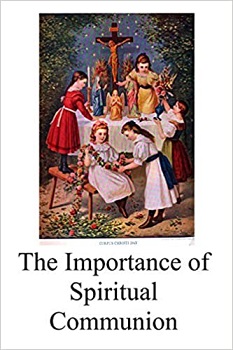
The Importance of Spiritual Communion
Kindle $2.99 / Paperback $5.99
If we cannot receive Holy Communion actually, then let us do so spiritually. These prayers and instructions have been gathered from the Saints and other venerated spiritual writers. Spiritual Communion has been a part of the spiritual life for decades. Growing up I was instructed to make a Spiritual Communion, when I could not go to Communion such as when I assisted at a second Mass. The same is true if one finds oneself at Mass, but not fasting. There are times coming, when it will be difficult, if not impossible to assist at the Holy Sacrifice of the Mass. We should be prepared for such times.
For More Good Traditional Catholic Books:

Grandmother's Own Cabbage Rolls

Prep: 30 mins
Cook: 2 hrs
Total: 2 hrs 30 mins
Yield: 12 servings
Ingredients
2 cups uncooked long-grain rice
4 cups water
2 large heads savoy cabbage
1 cup water
2 onions, chopped
3 tablespoons butter
¾ cup uncooked long-grain rice
1 pound extra-lean ground beef
½ pound pork sausage
4 cloves garlic, minced
2 teaspoons dried dill weed
¾ teaspoon salt
½ teaspoon ground black pepper
½ teaspoon white sugar
1 (26 ounce) can condensed tomato soup
1 (28 ounce) can whole peeled tomatoes, with liquid
8 bay leaves
Directions
1 Wash rice thoroughly. In a medium saucepan, combine 2 cups rice and 4 cups water. Bring to boil; reduce heat, cover and simmer for 20 minutes or until all of the water is absorbed.
2 In the meantime, remove the core from the cabbages using a thin, long knife. Place 1 cabbage in a microwave proof container with a lid with core side down. Pour 1/2 cup water into the container with the cabbage, cover and microwave on HIGH (full power) for 10 minutes. Carefully turn cabbage over and cook covered for an additional 10 minutes. When cabbage is cooked, let sit until it is cool enough to handle. Separate leaves carefully, removing any tough ribs. Cook the second cabbage in the same manner.
3 Divide chopped onions in half. Saute one half of the onions in 3 tablespoons butter; cook just until translucent (do not brown). In a large mixing bowl, mix together both the cooked and uncooked rice, cooked and uncooked onions, ground beef, pork sausage, garlic, dill weed, salt, black pepper and sugar and mix well to blend.
4 Spoon about 2 tablespoons of mixture onto each cabbage leaf. Bring one end of cabbage leaf over mixture, roll and tuck ends in to prevent any filling from falling out.
5 Preheat oven to 350 degrees F (175 degrees C). Prepare two 9x13 inch casserole dishes by placing some left over cabbage leaves in bottom of each. Arrange cabbage rolls in a single layer tight against each other.
6 In a food processor or blender, process condensed tomato soup and tomatoes. Pour tomato mixture over the cabbage rolls until just covered. Place 4 bay leaves on top of sauce in each dish. Cover each dish tightly with aluminum foil.
7 Bake in a preheated 350 degrees F (175 degrees C) oven for 2 hours. Once cooked, remove the dishes from the oven and let cool for 15 minutes before removing aluminum foil. Serve hot.
Lentil Vegetable Soup with Wild Rice
A satisfying and nutritious soup that can be served on days of fast and abstinence.
Minutes to Prepare: 15
Minutes to Cook: 45
Number of Servings: 4
Ingredients
3/4 cup lentils, sorted and rinsed
3/4 cup diced carrot
3/4 cup diced celery
3/4 cup chopped onion
1/4 cup wild rice
1/4 cup converted rice (like Uncle Ben's)
2 cloves garlic, minced
1 teaspoon dried oregano
1/4 teaspoon dried thyme
5 cups water
4 teaspoons vegetable bouillon seasoning
1 bay leaf
1 14-1/2 oz. can cut up tomatoes
1 tablespoon Worcestershire sauce
1 tablespoon apple cider vinegar
1/4 cup minced fresh parsley
2 tablespoons minced fresh basil, optional
V-8 or tomato juice or water, optional
Directions
Combine all ingredients on the list through the canned tomatoes in a large pot (do not add the Worcestershire sauce, vinegar, parsley or basil yet). Bring to a boil, then simmer until lentils and rice are tender (about 35-45 minutes). Remove the bay leaf. Scoop out about two cups of the soup and blend well in the blender. Return the blended soup to the pot. Now stir in the Worcestershire sauce, the apple cider vinegar, the fresh parsley (and the fresh basil if using). You should have about 8 cups of soup. If you don't have 8 cups, or if you prefer a thinner soup you can stir in some V-8, tomato juice, or water as you wish. Makes 4 servings, 2 cups each.
Number of Servings: 4
Video sermons and instructions: Timeless timely truths for living the Faith
Sexagesima Sunday, 2012.
Quinquagesima Sunday, 2012.
Ash Wednesday 2013
First Sunday in Lent, 2012.
Vintage: EP5 S1 Pride and the Great Apostasy

Encouragement for Today
Therefore encourage one another and build one another up.... I Thessalonians 5:11
We believe that through our assorted podcasts, Vlogs, audio downloads and devotional blogs, you will find an assorted Treasure Chest of...
- Sermons
- Classic Catholic Audio Books.
- Devotionals
- Scripture Studies
- Catechism Lessons
- Old-Time Christian radio programs
- Catholic Videos
...that will be a help in your faithful walk with the Lord.
LEARN MORE AT THE ENCOURAGEMENT FOR TODAY WEBSITE: https://www.encouragementfortoday.com
Day One
Genesis 1:1-5
In the beginning God created heaven, and earth.And the earth was void and empty, and darkness was upon the face of the deep; and the spirit of God moved over the waters. And God said: Be light made. And light was made. And God saw the light that it was good; and he divided the light from the darkness. An he called the light Day, and the darkness Night; and there was evening and morning one day.
Genesis 1:1
Let's analyze the first day of creation in detail. It begins with: “In the beginning, God created heaven, and earth.”
This was the first miracle of Jesus recorded in the Bible. In Colossians 1:16 we are told that Jesus (who is God) created all things: “For in him were all things created in heaven and on earth, visible and invisible, whether thrones, or dominations, or principalities, or powers: all things were created by him and in him.” -the first miracle of Jesus was creation!
“In the beginning God created...” What an exciting statement! If this first verse in God's Word isn't true, then none of the rest of the Bible is true! This is one of the most important sentences in the Bible. If we believe this verse from Genesis (the first book ) to Revelation (the last book)
Catechism Catch-Up
Is Infant Baptism Christian?
The practice of infant baptism has no explicit biblical support. There is no example of anyone born to Christian parents being baptized in the New Testament at any age, and no precept addresses their specific situation. The time and circumstances that are appropriate for baptizing such children must be inferred from general biblical teaching concerning baptism.
There are many good people who insist that infant baptism is not baptism at all. This is because they have a different understanding of baptism. In their view, baptism is principally a testimony given by the person baptized, first in word and then symbolically in water. Since an infant cannot give a testimony, a genuine infant baptism is an impossibility.
However, the Bible nowhere portrays baptism as the testimony of the person baptized. Passages that link faith to baptism (such as Acts 8:12; 18:8) simply show that faith, publicly professed, is a necessary condition for baptism. Indeed, it is appropriate to include a statement of faith in the baptismal ceremony. However, a baptism itself (the application of water, with accompanying words) is a statement by God (through the Church) to and about the person being baptized, not a statement by that person. The person baptized, under the norm, is the recipient of baptism from a Priest of Jesus Christ, acting in his name (Matthew 28:18–20; cf. Acts 2:37–42; 8:16; 35–38).
Once we recognize that faith is a condition for baptism, and that baptism itself is not a demonstration of faith by the person baptized, the question can be asked, Whose faith is required? As we look now at the relevant biblical teaching, we will see that the faith of parents fully suffices for the baptism of their children.
Baptism and Discipleship
When Jesus instituted Christian baptism, he instructed his disciples to “teach ye all nations; baptizing ... [and] Teaching them to observe all things whatsoever I have commanded you.” (Matthew 28:19–20). Baptism, then, begins the discipling process, which continues throughout one’s life. Everyone recognizes that the children of believers should “obey their parents in the Lord: for this is right...That it may be well with them, and they mayest live long on the earth. And, ye fathers, provoke not your children to wrath: but bring them up in the nurture and admonition of the Lord.” (Ephesians 6:1–3-4). But this passage indicates that they should be baptized first.
On the Day of Pentecost, those who received and were converted by the Word preached by Peter “were baptized; and there were added (to the Church) in that day about three thousand souls.” (Acts 2:41). They then received instruction “in the apostles’ doctrines” and participated fully in the Holy Eucharist and in prayer (vs. 42). Again we see that baptism marks one’s entrance into the church, into the fellowship of the saints. But what about the children of these converts? Were they baptized and included in the church fellowship? There are those who want to leave children unbaptized but include them in the life of the church, but that is not the pattern that God has handed down to us.
Children of Abraham
In order to understand the proper place of children in the Church, it is necessary to understand that the Church consists of those who have received the promise of spiritual blessing that was given to Abraham. The third chapter of Galatians spells this out carefully, concluding, “And if you be Christ's, then are you the seed of Abraham, heirs according to the promise.” (Galatians 3:29).
This means that the covenant that God made with Abraham remains in effect today. Otherwise, we could not be Abraham’s offspring, receiving what was promised to him and his descendants.
The Abrahamic covenant (Genesis 12:1–3; 15:1–7; 17:1–14) was confirmed to his son Isaac (Genesis 26:1–5, 23–24) and his grandson Jacob (Genesis 28:10–15; cf. 48:15–16; 50:24). It continued with the nation of Israel (Exodus 2:24; 6:2–8), for whom the Law of Moses was added until the time of Christ (Galatians 3:17–19), in whom the promises given to Abraham were fulfilled (vss. 16, 22–28).
After Abraham believed God and exercised faith in God’s covenant promises, it was reputed to him unto justice (Genesis 15:6), the Lord added the rite of circumcision to the covenant arrangement (Genesis 17:9–14). He received “And he received the sign of circumcision, a seal of the justice of the faith, which he [already] had, being uncircumcised” (Romans 4:11). Because Abraham was righteous (his sins were forgiven) as the result of his faith, he was circumcised as a sign given by God that sealed that righteousness. Physical, outward circumcision signified spiritual, inward cleansing of the heart, a spiritual reality for Abraham and all his true, believing descendants. "For he is not a Jew, who is so outwardly; nor is that circumcision which is outwardly in the flesh: But he is a Jew, that is one inwardly; and the circumcision is that of the heart, in the spirit, not in the letter; whose praise is not of men, but of God." (Romans 2:28-29) Also read Ezekiel 44:7.
Not only Abraham, but henceforth all males that were eight days old was to be circumcised among them. throughout all generations (Genesis 17:12–13). Circumcision marked one’s entrance into the covenant community; without it, "that soul shall be cut off from his people: because he hath broken my covenant.” (vs. 14).
This was God’s way of signifying that the promises given to faithful Abraham extended also to his children (and anyone else who came under and accepted his authority). Some of those, like his son Ishmael, left the covenant community and renounced the faith of Abraham. Others in Israel’s sordid history remained in the covenant community, but did not share the faith of Abraham. A remnant, however, by the grace of God, remained faithful.
A New Covenant Sign
Into the circumcised community was born Jesus, in whom the promise of the Spirit by faith for all peoples of the world, not just Jews, would come. (Galatians 3:8–9, 14). The line of physical descent from Abraham reached its climax in the person of Jesus (Galatians 16, 19). After him, only spiritual descent mattered (vss. 7–9, 25–26). Converts would no longer be incorporated into the nation of Israel.
Consequently, a covenant sign that focused on physical descent through the male line was no longer appropriate. A new sign of the covenant was needed—one that all people, whether Jew or Gentile, male or female, could receive. As we have seen, water baptism was instituted by Jesus as the new sign of entrance into the community of faith. Essentially, then, baptism replaced circumcision.
The change from circumcision to baptism is reflected in Acts 8:12, where we read that Samaritans were being baptized, “both men and women” There is no reason to point out that people of both genders were now receiving the sign of the covenant, except to contrast it with the old sign of the covenant. Implied in this contrast is the fact that baptism had replaced circumcision.
Spiritual Circumcision
There were Judaizers in the Church who wanted Gentile converts to be circumcised and to follow the whole Mosaic law. But in various epistles, Paul insisted that Christians not only had nothing to gain from circumcision and Judaism, but actually had everything to lose! Writing to the Colossians, he declared that Christians were complete in Christ and should not look to Judaism or any other religion to supplement their faith (Colossians 2:8–23). His statements specifically about circumcision and baptism, in verses 11–12, deserve close attention. In theses verses we read, “In whom also ye are circumcised with the circumcision made without hands, in putting off the body of the sins of the flesh by the circumcision of Christ: Buried with him in baptism, wherein also ye are risen with him through the faith of the operation of God, who hath raised him from the dead.”
Christians have no need for physical circumcision, Paul indicates, because “in Him”—that is, as part of their spiritual union with Christ—they have already been “circumcised with a circumcision made without hands” (vs. 11). That is, they have already received that inward circumcision, that spiritual cleansing of the heart, that is effected by the Holy Spirit. In Romans 2:28–29, Paul refers to this as inward circumcision, “of the heart, in the spirit, not in the letter.”
This circumcision of Christ, Paul continues, consists of “putting off, disposing of the body of the sins of the flesh” (Colossians 2:11). But what is “the body of the flesh”? An important textual variant here reads “power of your sinful self.”(ESV) or “your selfish desires.” (CEV) In either case, another contrast with circumcision is in view. Physical circumcision removes a small piece of flesh. But spiritual circumcision, removes or puts off the whole body of sinful flesh, that is, “our old man”, (our old self), “that the body of sin (the desires of the old self or the old man) may be destroyed”. When the Spirit cleanses the heart, the whole weight of sin is removed, and the sinful flesh is renounced so that we “would no longer be the slaves of sin.” (Romans 6:6).
This spiritual cleansing, Paul continues, is effected in “the circumcision of Christ” (Colossians 2:11). Since this verse has all along been speaking of the spiritual experience of the sinner, “the circumcision of Christ” must likewise be something in Christian experience, not something in the life of Jesus (as some suppose). It is the spiritual circumcising that belongs to Christ—“the circumcision done by Christ” or simply “Christian circumcision.” The Judaizers were insisting on the physical circumcision set forth in the Law of Moses; Paul was upholding the spiritual circumcision of Christ.
Paul’s opponents might well have agreed that an inward cleansing was in order. However, they would have insisted that this be signified by physical circumcision. But Paul indicates that that is not necessary, for the Christian has already been “buried with Him” [that is, Christ] in baptism (Colossians 2:12; cf. Romans 6:4–5). Physical circumcision has nothing to add.
A new sign, baptism, has been received.
Finally, Christians have been “raised to life because they had faith in the power of God, who raised Christ from death” (Colossians 2:12). “For we are buried together with him by baptism into death, that as Christ is risen from the dead...so we also may walk in newness of life.” (Romans 6:4). What do the Judaizers have to offer in comparison with that? We are already complete we are already full in Christ (Colossians 2:10)!
It is part of the teaching of Colossians 2:11–12, then, that baptism has replaced circumcision for the covenant community. The Abrahamic covenant is fulfilled in the new covenant, and circumcision has been replaced by baptism as the sign and seal of the righteousness of faith.
Children in the Church
Under the Abrahamic covenant, those who were born within the covenant community received the sign of the covenant as infants. Because the Abrahamic covenant remains in effect, but with the sign of it having been changed, it follows that those who are born within the covenant community should be baptized as infants, just as they were formerly circumcised as infants. They should be baptized at the start of the discipling process, as outlined by Jesus.
If there are any doubts as to the “fitness” of infants to be raised as disciples of Jesus, he himself dispelled them. When children were brought to Jesus by their parents for his blessing, the disciples tried to brush them aside (Mark 10:13–16). But Jesus said, “Suffer the little children to come unto me, and forbid them not; for of such is the kingdom of God” These children included “infants” (Luke 18:15); Jesus “took them up in His arms and laying his hands upon them, he blessed them” (Mark 10:16).
Some would say that Jesus welcomed them just to teach adults a lesson (see Luke 18:17). But if infants do not qualify for the kingdom of God, then how can adults qualify by being like them? There is no lesson for adults to learn unless Jesus welcomes the infants of believers into his kingdom. That kingdom, today, is essentially the Church, the body of Christ, with Jesus as the head, ruling, with a Pope being his representative of authority here on earth (Matthew 16:18–19). Since people are visibly received into the church by baptism, it follows that infants are to be received into the kingdom of God by baptism.
Faith and Baptism
As we have seen, circumcision under the Abrahamic covenant was applied to infants on the basis of parental faith (Genesis 17; Romans 4:11). Since we today are part of that covenant through faith in Christ, the new sign of the covenant, water baptism, should likewise be applied to infants on the basis of parental faith.
That theological conclusion is confirmed by the accounts in the book of Acts which reveal that whole households were commonly baptized on the basis of the faith of the head of the household.
The most detailed and informative account for this conclusion is that of the Philippian jailer (Acts 16:30–34). “Believe in the Lord Jesus,” he was told, “and thou shalt be saved, and thy house.” (vs. 31; cf. 11:14). Accordingly, the gospel was preached “to him and to all that were in his house.” (vs. 32). In response, he “believing God with all his house.” (vs. 34), whereupon “was baptized, and all his house immediately.” (vs. 33).
The key word in this passage is “with.” (vs 34) It signifies accompaniment.
When Luke says that the jailer heard the gospel and believed with his household, the implication is that everyone in his household went along with him. Any older household members, such as his wife, evidently became believers, too. But any young children went along with their father, following his lead with whatever limited understanding that they had.
This crucial distinction between “with” and “and” is clear in similar passages in Acts: 1:14; 3:4; 4:27; 5:1; 10:2; 14:13; 15:22; 21:5. In each case, “with” introduces those who follow the lead of others and join with them in their activity, however actively or passively. In Acts 21:5, for example, Paul is escorted to the harbor by all the men in the church at Tyre, “with wives and children,” which no doubt included a number of small infants.
In the household baptism passages, the head of the house always believes “with” his household, but he and they are baptized. Just as the heads of households escorted Paul to the harbor “with” infants who were only passive participants, so also heads of households were baptized “with” whatever infants were in their families.
Some would argue that there may not have been any infants in these households mentioned in Acts. However, household baptism was evidently a common practice in the apostolic church (see also 1 Corinthians 1:16). It must have happened thousands of times, often including infants.
You and Your Children
Paul’s promise to the Philippian jailer, that salvation would come to his whole house if he believed in Jesus, was no different from what Peter told three thousand adult converts at Pentecost. The promise of the Holy Spirit , Peter said, was “to you, and to your children, and to all that are far off, whomsoever the Lord our God shall call.” (Acts 2:39).
These converts had just been called by the Lord into fellowship with himself, and many other adults (them that are "far off”) would be called in the future, but the children of these converts formed a third category: they were called into fellowship with Christ together with their parents (or even merely one parent: see 1 Corinthians 7:14). Such is the grace of God to the children of believers! We can only infer that the children of the first Christian converts were baptized, brought up in the Christian faith (see Ephesians 6:1–4; Colossians 3:20–21), and, at some point were confirmed.
Conclusion
When we look carefully at the teaching of Scripture, we see that the sign of the covenant was applied to infants prior to Christ, and presumably continued to be applied to them when Jesus changed it to baptism. And when we look closely at the household baptisms described in Acts, there can be little doubt but that infants were commonly baptized in the apostolic church. They were baptized then, and they should be baptized now, on the basis of God’s promise to bless the children of believers. The faith of a parent qualifies a child to be baptized and raised as a disciple of Jesus. He welcomed them into his kingdom, and so should we.
READ MORE FROM THE TRADITIONAL CATECHISM AT THE WEBSITE: https://www.traditionalcatechism.com
Living Catholic:
Seven Basic Principles That Govern our Personal Lives and Relationships

These seven principles are:
design, authority, responsibility, suffering, ownership, freedom, success
Just as there are universal laws that govern the world of nature, there are basic principles that govern our personal lives and relationships. These seven Biblical principles apply to every person, regardless of culture, background, religion, age, education, or social status.
An understanding of these principles can bring insights into the cause-and-effect sequences of life. Consequently, individuals can become equipped to make wise choices and avoid failure.
Design
God has a precise purpose for each person, object, and relationship that He creates. As we understand and live in harmony with His design, we will discover self-acceptance, identity, and fulfillment in life.
Authority
God assigns various responsibilities to parents, church leaders, government officials, and other authorities. As we learn to acknowledge and honor these authorities, we can see God work through them to provide direction and protection in our lives. Honoring our authorities brings inward peace.
Responsibility
God holds us accountable for every word, thought, action, attitude, and motive. When we offend others, asking for forgiveness and making proper restitution are essential steps to maintaining a clear conscience.
Suffering
The hurts of offenders can reveal our “blind spots.” God grants us grace for personal cleansing, growth, and achievement as we learn to respond with full forgiveness to those who offend us.
Ownership
Everything we have has been entrusted to us by God, and we are to use these resources wisely. Yielding our personal rights and expectations to God brings true security and enables us to overcome anger and worry.
Freedom
Godly freedom is not the privilege to do what we want; rather, Godly freedom is the power to do what is right. Regaining ground that has been surrendered to sin brings moral purity, equipping us to serve others in genuine love.
Success
We can discover God’s purpose for our lives by engrafting Scripture into our hearts and minds, using it to “think God’s thoughts” and to build a foundation for making wise decisions.
To Learn More Principles For Life Go To: Resources: Principles of Life


Pray for the Holy Father! Pray with the Holy Father!
- Your prayers are asked this month and every month for the intentions of the Holy Father, Pope Michael.
- Please pray for the success and growth of the new Chrysostom Bible Institute. Check out the wonderful work it is doing and see how you can get involved!
- Your prayers and support are asked in a special way for the soon to be established House of Prayer.
- Pray especially that the Holy Ghost inspires and helps us prepare spiritual manuals and days of recollection to make available to all.
- Keep in your prayers our Podcast Ministry, a new way to reach out in the missionary work of the Church! We ask for prayers for our other activities world wide. We have made good contacts in the Philippines and Japan and ask prayers that these contacts will bear much fruit for the salvation of souls.
- Be sure to keep St. Helen Catholic Mission in your prayers. Why not go on over to the site now and see what they have to offer and how you might be able to help!
- Also we ask you to keep in prayer our increasing missionary work in the United States and elsewhere.
- Pray for those outside the Church and those who do not know God, that they may see the light of grace and be led safely home to the refuge of the Holy Catholic Church.
- As always, we also ask that you pray for yourself! Never forget your own state of soul. God is calling you to His service in His love. We know that our Lord can count on you to answer.
- We are all praying especially for you, too. May you correspond with every grace of God!
- In what other needs or intentions may we pray for you? Let us know!
- Let us remember that the Church runs on prayer. Without your prayers, God will not work in hearts and souls to bring them to a knowledge of the truth. (I Timothy 2:4)


To Donate online go to:

To Donate by Mail:
Our address is
Vatican in Exile
829 NE Chester
Topeka, Kansas 66616
Make Checks payable to:
Vatican in Exile


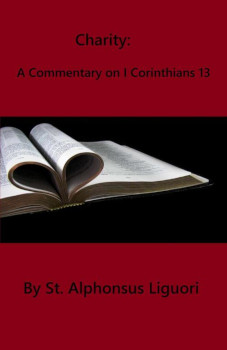
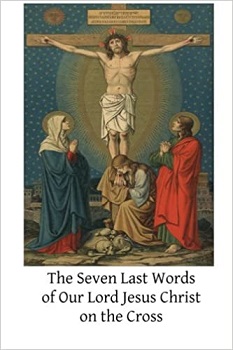
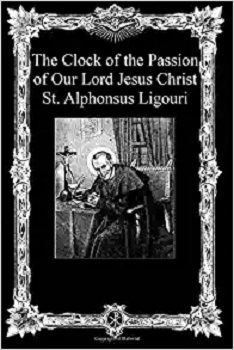
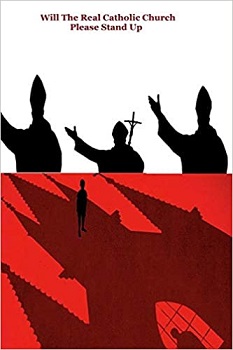










 Follow
Follow


